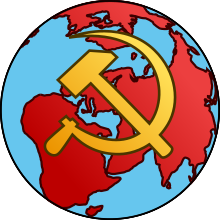Bolshevization
[3][4] Prior to 1924 Bolshevization included that parties affiliated to the Communist International were based on the principles of democratic centralism.
...Respect for Bolshevik achievements and defense of the Russian Revolution now transmuted into dependency on Moscow and belief in Soviet infallibility.
One view on this process can be seen by utilizing “insights from Sovietologists to argue that Stalinism constituted a politics and practice connected with but distinct from Bolshevism.
"[2] The Sixth Congress of the Communist International in 1928 took a radical turn as the Comintern decided that capitalism was reaching its final stages.
[7] A number of senior KPD (German Communist Party) leaders, in exile in the Soviet Union, were caught up in Joseph Stalin's Great Purge of 1937–1938 and executed.
